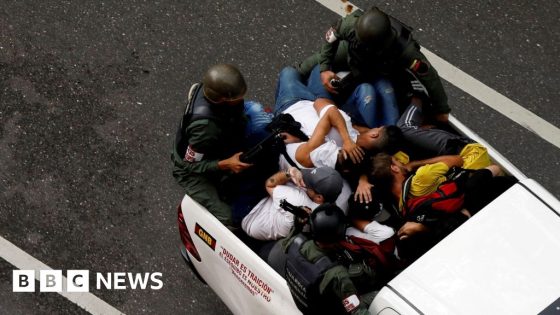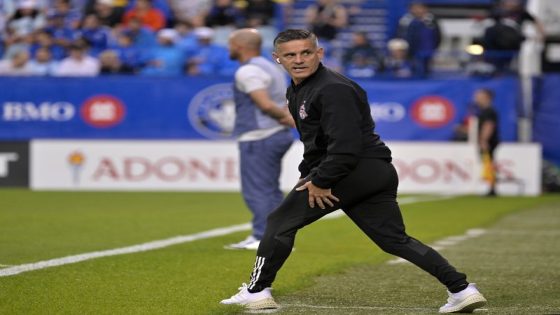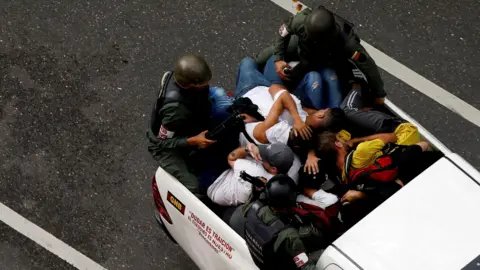 Reuters
Reuters“I haven’t been able to see him. Or give him food. Or hand him his clothes. I don’t know if he has been beaten. I don’t know if he has bathed. Or eaten.”
‘Isabella’, who did not want to be named, is desperately worried for her son.
Through tears, she explains that he, 28, and his girlfriend, 17, were arrested and beaten after the family joined a march in Caracas protesting against Venezuelan President Nicolás Maduro the day after Sunday’s presidential election.
Mr Maduro claimed victory, which was instantly disputed by the opposition who say they have evidence from electronic voting machines that they, not the government, won.
They and many governments around the world have demanded proof from President Maduro that he won the election.
He has said he will publish the vote tallies, but not when.
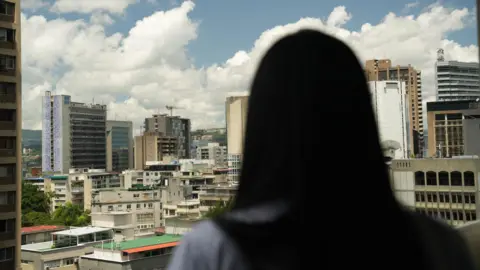 Paulo Koba / BBC
Paulo Koba / BBCOpposition leader María Corina Machado has called for protests “in every city” in Venezuela on Saturday against President Maduro and the disputed election result.
She said on social media “we must remain firm, organised and mobilised with the pride of having achieved a historic victory on 28 July”.
The government has said Ms Machado should be arrested.
It comes after Ms Machado wrote in the Wall Street Journal she is in “hiding” and fearing for her “life” and “freedom.”
So far, the Venezuelan government says more than 1,000 people have been arrested in protests set off by the disputed election.
Isabella has very little information about her son. She has been waiting anxiously outside the police station where she believes he is, hoping for answers.
She says on Monday the National Guard “unjustly grabbed” her son and others at the march:
“They were not harming anyone. They did not have stones. They did not have weapons. They only protested.
“They beat him. They accused them of being terrorists for defending their country, for wanting change,” she says.
“We went out to march because we want a change, because we can no longer stand this government. There is so much misery, so much hunger, so much crime, so much injustice towards innocent people, many people dying in hospitals.”
She shows us a photograph of her granddaughter who she says died in December last year because there was no oxygen for treatment in the hospital where she was.
“There were 12 children who died because there was no oxygen,” she says.
“I want Venezuela to be the same as before, where we work with dignity. Where we earned a decent salary. Where our children and grandchildren could study. My daughter and son left university because there are no teachers.
“The government does not want kids to study, it wants us to continue in misery, to be ignorant, to not speak out. How is it possible that you go to a hospital and you have to buy everything? There is no oxygen. There is nothing.”
She said her son was accused of “terrorism” which can carry a sentence of years in prison, but she says the government has no evidence.
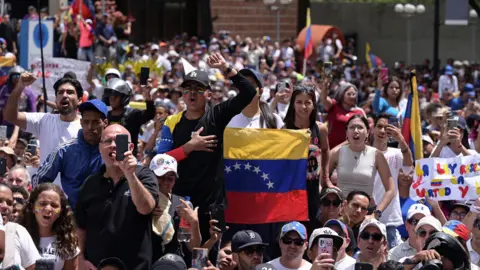 Reuters
ReutersAlberto Romero, a lawyer with the human rights group Foro Penal, said there were about 200 people detained just in the police station where Isabella has been waiting, including children.
“There are 11 minors here,” he said.
“It’s totally illegal. This is not actually a prison, it’s just a police station. It’s not possible for lawyers to get in. No one has had the opportunity to see these people that are being detained, we don’t know the conditions.”
The judiciary in Venezuela is controlled by the government.
“The people detained are not allowed private defenders. Public defenders are part of the state. So the one who accused you, is the one who defends you,” he added.
He said that many of the families who he is representing had relatives detained for just “walking in the street” on the day of protests, adding the purpose was “intimidation” of the Venezuelan people.
Foro Penal have verified and identified 711 people who have been detained and 11 people who have died since 29 August when protests began.
Venezuela’s attorney general has said there have been more than 1,000 detentions.
An opposition politician, Freddy Superlano, who has been a fierce critic of President Maduro has also been detained. A video shared on social media showed six men putting him in a van and taking him away.
His family have demanded proof that he is still alive and do not know his whereabouts.
On Wednesday, President Maduro asked the Supreme Court to act against protesters – paving the way for further arrests.
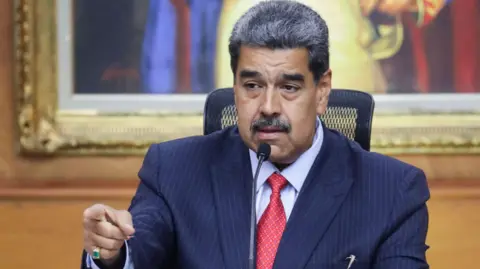 EPA
EPAHis government has also accused the opposition leader, Ms Machado, and its presidential candidate, Edmundo González, of inciting violence by disputing the election result and has said they should be arrested.
President Maduro called the opposition leaders a “perverse and macabre duo who have to take responsibility” for protesters he described as “criminals.”
He has strongly denied electoral fraud and has accused the opposition of instigating a “coup”.
But, in an intervention, US Secretary of State Antony Blinken said Washington rejected Mr Maduro’s “unsubstantiated allegations” against opposition leaders.
In a statement Mr Blinken said threats to arrest Ms Machado and Mr González “are an undemocratic attempt to repress political participation and retain power”.
“All Venezuelans arrested while peacefully exercising their right to participate in the electoral process or demand transparency in the tabulation and announcement of results should be released immediately,” Mr Blinken added.
“Law enforcement and security forces should not become an instrument of political violence used against citizens exercising their democratic rights.”
Despite the spectre of detentions growing, many Venezuelans are determined to continue protesting – although some are deterred by fear.
Isabella, in spite of what happened to her son, described the protests as “incredible”.
“Everyone now has internet, WiFi, Instagram, TikTok. Everyone passed a statement through the neighbourhoods saying ‘Let’s March. Let’s join for a better Venezuela’.”
She explained how the slum neighbourhood of Petare, which used to be a stronghold for the president “began to descend” from the mountains to the city.
“They started to go down, shouting, with pots, pans, and flags. Barefoot children, mothers carrying children to the march.
“The colectivo [armed paramilitaries who support Mr Maduro] yelled at us, cursed us, threw stones at us, told us ‘Viva Maduro!’ The authorities started throwing tear gas at us.
“We don’t know how this is going to end. We don’t want dead people.”
Source Agencies

